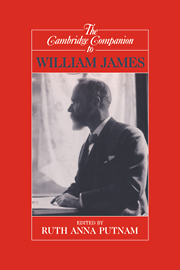Book contents
- Frontmatter
- Introduction
- 1 Pragmatism and introspective psychology
- 2 Consciousness as a pragmatist views it
- 3 John Dewey's naturalization of William James
- 4 James, Clifford, and the scientific conscience
- 5 Religious faith, intellectual responsibility, and romance
- 6 The breathtaking intimacy of the material world
- 7 James, aboutness, and his British critics
- 8 Logical principles and philosophical attitudes
- 9 James's theory of truth
- 10 The James/Royce dispute and the development of Jarnests "solution"
- 11 William James on religious experience
- 12 Interpreting the universe after a social analogy
- 13 Moral philosophy and the development of morality
- 14 Some of life's ideals
- 15 “A shelter of the mind”
- 16 The influence of William James on American culture
- 17 Pragmatism, politics, and the corridor
- 18 James and the Kantian tradition
- Bibliography
- Index
13 - Moral philosophy and the development of morality
Published online by Cambridge University Press: 28 May 2006
- Frontmatter
- Introduction
- 1 Pragmatism and introspective psychology
- 2 Consciousness as a pragmatist views it
- 3 John Dewey's naturalization of William James
- 4 James, Clifford, and the scientific conscience
- 5 Religious faith, intellectual responsibility, and romance
- 6 The breathtaking intimacy of the material world
- 7 James, aboutness, and his British critics
- 8 Logical principles and philosophical attitudes
- 9 James's theory of truth
- 10 The James/Royce dispute and the development of Jarnests "solution"
- 11 William James on religious experience
- 12 Interpreting the universe after a social analogy
- 13 Moral philosophy and the development of morality
- 14 Some of life's ideals
- 15 “A shelter of the mind”
- 16 The influence of William James on American culture
- 17 Pragmatism, politics, and the corridor
- 18 James and the Kantian tradition
- Bibliography
- Index
Summary
In “The Moral Philosopher and the Moral Life” (WB,* 184-216), William James offers a general survey of moral philosophy and its central problems. Its main interests lie in answering what James calls the “casuistic” question of the “measure of the various goods and ills which men recognise,” and in the role which religious belief may play there. In that standard context of a justification for moral principles, he veers toward a utilitarian view but is also critical of any such philosophical task. But before he discusses that question he also identifies and answers two others; first a “psychological” question about the “historical origin of our moral ideas” and second a “metaphysical” question about the “meaning of the words 'good,' 'ill' and 'obligation' ” (185). The apparent contrast between those two questions is, however, blurred in James's answers to them. For even the metaphysical question, it seems, has more to do with the origins of moral discriminations than with what we should understand as an account of the meanings of those moral terms. This raises a general problem about James's enterprise in those two initial sections which I want to consider in this essay.
- Type
- Chapter
- Information
- The Cambridge Companion to William James , pp. 260 - 281Publisher: Cambridge University PressPrint publication year: 1997
- 5
- Cited by

